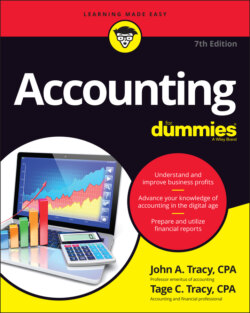Читать книгу Accounting For Dummies - John A. Tracy - Страница 67
Hire competent personnel
ОглавлениеA business shouldn’t be penny-wise and pound-foolish. What good is meticulously collecting source documents if the information on those documents isn’t entered into your system correctly? You shouldn’t try to save a few bucks by hiring the lowest-paid people you can find. Bookkeepers and accountants, like all other employees in a business, should have the skills and knowledge needed to perform their functions. Here are some guidelines for choosing the right people to enter and control the flow of your business’s data and for making sure that those people remain the right people:
College degree: Many accountants in business organizations have a college degree with a major in accounting. However, as you move down the accounting department, you find that more and more employees do not have a college degree and perhaps don’t even have any courses in accounting — they learned bookkeeping methods and skills through on-the-job training or possibly from vocational schools. Although these employees may have good skills and instincts, our experience has been that they tend to do things by the book, so you want to at least think twice about a potential employee who has no college-based accounting background.
Professional credentials: When hiring higher-level accountants in a business organization, you want to determine whether they should be certified public accountants (CPAs). Larger businesses insist on this credential, along with a specific number of years’ experience in public accounting.Until recently, the only other main professional accounting credential was the CMA, or certified management accountant, sponsored by the Institute of Management Accountants (IMA). The CMA credential is American born and bred. In contrast, the Chartered Global Management Accountant (CGMA) designation is co-sponsored by the American Institute of CPAs and the British Chartered Institute of Management Accountants. Unlike the CPA license, the CMA and CGMA designations recognize professional achievement and experience, but the government doesn’t regulate these credentials. (We discuss the CPA in Chapter 1.)Note: For bookkeepers, the American Institute of Professional Bookkeepers sponsors the Certified Bookkeeper designation. For more information, go to
www.AIPB.org.In our opinion, a business is prudent to require the CPA, CGMA, or CMA credential for its chief accountant (who usually holds the title of controller). Alternatively, a business could regularly consult with a CPA in public practice for advice on its accounting system and on accounting problems that come up.More and more, businesses are turning to experts in recognizing fraud, embezzlement, and cybercrime for advice and to investigate suspicious situations. Even relatively small businesses are vulnerable to these threats. One mark of expertise that you could look for is the Certified in Financial Forensics (CFF) credential sponsored by the American Institute of Certified Public Accountants (AICPA).Continuing education: Bookkeepers and accountants need continuing education to keep up with changes in the income tax law and financial reporting requirements as well as changes in how the business operates. Ideally, bookkeepers and accountants should be able to spot needed improvements and implement these changes in order to make accounting reports to managers more useful. Fortunately, many short-term courses, online programs, and the like are available at very reasonable costs for keeping up on the latest accounting developments. Many continuing education courses are available on the internet, but you should be cautious and check out the standards of an internet course. Although each state is slightly different, states require that CPAs in public practice take 30 to 40 hours per year of continuing education to keep their licenses.
Integrity: Possibly the most important quality to look for is also the hardest to judge. Bookkeepers and accountants need to be honest people because of the control they have over your business’s financial records. Conduct a careful background check when hiring new accounting personnel. After you hire them, periodically (and discreetly) check whether their lifestyles match their salaries, but be careful not to invade their privacy. Small-business owners and managers have closer day-in and day-out contact with their accountants and bookkeepers, which can be a real advantage — they get to know their accountants and bookkeepers on a personal level. Even so, we could tell you many true stories about long-time, “trusted” bookkeepers who made off with some of the family fortune.
